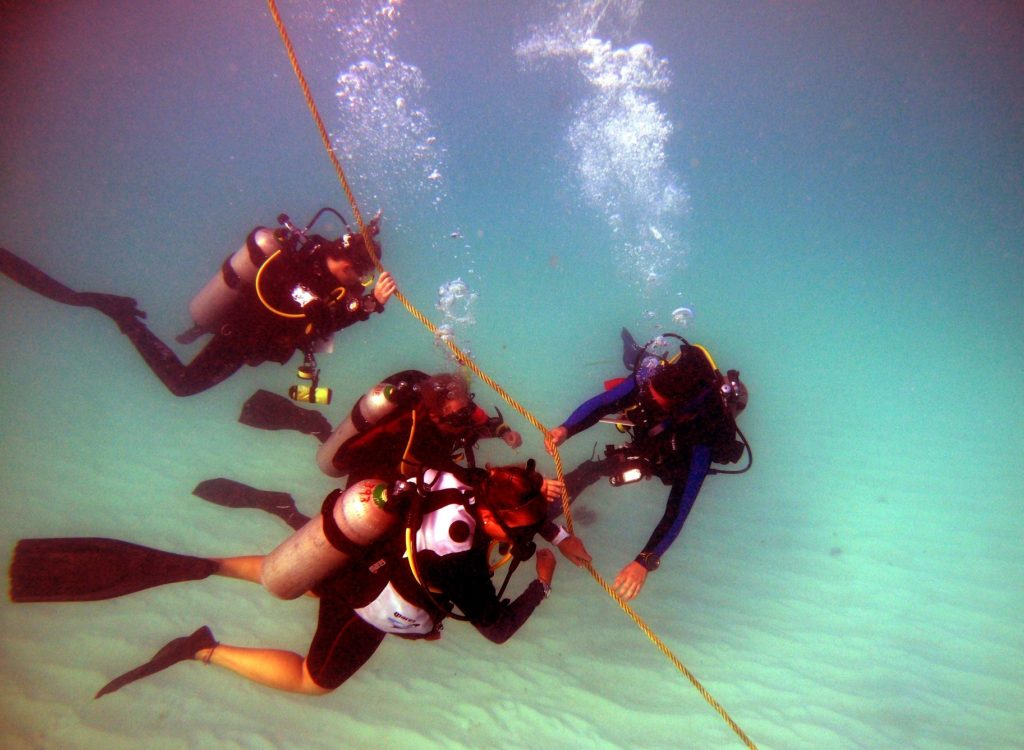If you are considering a career teaching scuba diving, then it’s important to consider the pros and cons. This blog is just one look at what you can expect working as a dive instructor.
It’s time for another blog post from me. That’s because I am laid in bed due to a nasty infection in an awkward place. Being unable to sit down or have any clothing touching your left buttock is a real inconvenience as it would be in any job. But the reason I am in this mess is partly the fault of being a dive instructor.
The infection started out as most do – a bite from a mosquito or some other beastie that you inadvertently itch, which becomes a bit bigger and redder each day. Then you go diving which only makes it worse. And poke about with it which again makes it worse. Most Divemasters and Instructors have at one time had something like this which keeps them out of the water – and therefore from earning money – for a few weeks. And with almost five years working in the dive industry I am lucky that this is my first.
Anyway, this isn’t intended to be an in-depth description of my “ass volcano” and I certainly won’t be including any photos, but my current situation got me thinking about the occupational hazards of being a dive pro compared to other jobs.
Well there are the obvious ones like decompression sickness (“the bends”). Of all the divers needing treatment in a recompression chamber the majority are Divemasters and Instructors making many dives day after day often with multiple ascents. But more at risk are the untrained divers who earn low pay working for ruthless fishing companies. In many cases these fishermen are given a tank and regulator (with no depth gauge or SPG to monitor their air – those are too expensive for the fishing companies) and are paid per catch. The fishermen go to where they find the most of what they are looking for (which, in the case of lobsters, can be 30 meters deep or more) and stay down there until they feel their air supply waning. Then they go straight to the surface with their catch, grab another tank, and start all over again. The fishing companies don’t insure their employees so when they inevitably require recompression treatment (costing thousands of dollars) the medical care comes from the private chamber operators giving the treatment for nothing or for a greatly reduced price, knowing that their standard invoice will never be settled. Think about that the next time you’re picking your Honduran Giant Prawns off the supermarket shelf.
Then there’s the less dangerous but no less significant hazard of poverty. I don’t think there is anyone in the world who thinks that dive instructors make a lot of money. Say the word “lawyer” however, and you think “ker-ching!” as the dollar signs go up in your eyes. Having exchanged my life as a lawyer in the UK for what it is now, I know that I earn considerably less now than I used to. But I also know that I am at least constantly in the black these days and no longer live beyond my means. Having a city centre apartment back in Leeds, gym membership, dinners with friends in the week and weekend mojitos in Mojo, it meant that I always spent just a little more than I should. Whilst I enjoyed my work as a lawyer, and loved my mojitos, it was all too bloody expensive. And “poverty” is relative. Living in places like Honduras and here in Malapascua I see what I would call real poverty every day.
What about an insecure future? Not settling down in one place, and “you can’t be a dive instructor forever” as your folks will warn you. Surely all this is a big con against all the pros? Well I would agree that some people feel more secure owning their own home, knowing that they will be living in the same town for the rest of their lives and taking comfort from what is familiar to them. But others, including myself, feel the opposite and desire change and new challenges, new faces etc.
As for the future – no, I can’t see myself doing this when I’m sixty. By that time my son will be twenty four and who knows where I will be. To me, forty is stretching the stereotypes of a scuba instructor but I’m not far off forty myself and intend to still be teaching scuba by then. Anyway, apart from being a funeral director I don’t think there are any professions where you can truly say you have a secure future in the 21st Century.
Many instructors think the only way forward is to open their own dive shop but for me this is the most insecure future you could choose – starting from zero, investing so much money plus all your time, love and effort, and risking losing everything if it is not successful. Many superb dive instructors do not make good managers, and most sadly, do not make successful dive shop owners.
In my view, anyone thinking about becoming a dive instructor should look at their future job without rose tinted spectacles and with an open mind and the recognition that all jobs – however ideal they seem on the surface – have the pros and cons.
For me, the vastly reduced cost of living in many “exotic” dive locations, the reduced stress levels, being in the outdoors every day and having the best playground in the world to bring up my son, all mean that the pros easily outweigh the cons and I will happily accept the odd grotesque skin infection as a downside of my career choice.
But next time, please can I have it anywhere but my arse cheek?


